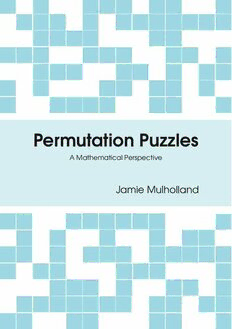Table Of ContentPermutation Puzzles
A Mathematical Perspective
Jamie Mulholland
Copyright(cid:13)c 2021JamieMulholland
SELF PUBLISHED
http://www.sfu.ca/~jtmulhol/permutationpuzzles
LicensedundertheCreativeCommonsAttribution-NonCommercial-ShareAlike4.0License(the
“License”). YoumaynotusethisdocumentexceptincompliancewiththeLicense. Youmayobtain
a copy of the License at http://creativecommons.org/licenses/by-nc-sa/4.0/. Unless
requiredbyapplicablelaworagreedtoinwriting,softwaredistributedundertheLicenseisdis-
tributed on an “AS IS” BASIS, WITHOUT WARRANTIES OR CONDITIONS OF ANY KIND, either
expressorimplied. SeetheLicenseforthespecificlanguagegoverningpermissionsandlimitations
undertheLicense.
Firstprinting,May2011
Contents
I Part One: Foundations
1 Permutation Puzzles ........................................... 11
1.1 Introduction 11
1.2 ACollectionofPuzzles 12
1.3 WhichbringsustotheDefinitionofaPermutationPuzzle 22
1.4 Exercises 22
2 A Bit of Set Theory ............................................ 25
2.1 Introduction 25
2.2 SetsandSubsets 25
2.3 LawsofSetTheory 26
2.4 ExamplesUsingSageMath 28
2.5 Exercises 30
II Part Two: Permutations
3 Permutations ................................................. 33
3.1 Permutation: PreliminaryDefinition 33
3.2 Permutation: MathematicalDefinition 35
3.3 ComposingPermutations 38
3.4 AssociativityofPermutationComposition 41
3.5 InversesofPermutations 42
3.6 TheSymmetricGroupS 45
n
3.7 RulesforExponents 46
3.8 OrderofaPermutation 47
3.9 Exercises 48
4 Permutations: Cycle Notation ................................. 51
4.1 Permutations: CycleNotation 51
4.2 ProductsofPermutations: Revisited 54
4.3 PropertiesofCycleForm 55
4.4 OrderofaPermutation: Revisited 55
4.5 InverseofaPermutation: Revisited 57
4.6 SummaryofPermutations 58
4.7 WorkingwithPermutationsinSageMath 59
4.8 Exercises 59
5 From Puzzles To Permutations .................................. 63
5.1 Introduction 63
5.2 Swap 64
5.3 15-Puzzle 66
5.4 OvalTrackPuzzle 67
5.5 HungarianRings 70
5.6 Rubik’sCube 71
5.7 Exercises 74
6 Permutations: Products of 2-Cycles ............................ 79
6.1 Introduction 79
6.2 Productof2-Cycles 80
6.3 SolvabilityofSwap 81
6.4 Exercises 82
7 Permutations: The Parity Theorem .............................. 83
7.1 Introduction 83
7.2 VariationofSwap 85
7.3 ProofoftheParityTheorem 86
7.4 Exercises 91
8 Permutations: A and 3-Cycles ................................ 95
n
8.1 SwapVariation: AChallenge 95
8.2 TheAlternatingGroupA 95
n
8.3 Productsof3-cycles 97
8.4 VariationsofSwap: Revisited 99
8.5 Exercises 100
9 The 15-Puzzle ................................................ 103
9.1 SolvabilityCriteria 103
9.2 ProofofSolvabilityCriteria 105
9.3 StrategyforSolution 108
9.4 Exercises 109
III Part Three: Group Theory
10 Groups ...................................................... 117
10.1 Group: Definition 117
10.2 SomeEverydayExamplesofGroups 120
10.3 FurtherExamplesofGroups 122
10.4 Exercises 134
11 Subgroups .................................................. 139
11.1 Subgroups 139
11.2 ExamplesofSubgroups 140
11.3 TheCenterofaGroup 141
11.4 Lagrange’sTheorem 142
11.5 CyclicGroupsRevisited 143
11.6 Cayley’sTheorem 145
11.7 Exercises 146
12 Puzzle Groups ............................................... 149
12.1 PuzzleGroups 149
12.2 Rubik’sCube 150
12.3 HungarianRings 157
12.4 15-Puzzle 158
12.5 Exercises 158
13 Commutators ............................................... 161
13.1 Commutators 161
13.2 CreatingPuzzlemoveswithCommutators 162
13.3 Exercises 170
14 Conjugates ................................................. 175
14.1 Conjugates 175
14.2 ModifyingPuzzlemoveswithConjugates 177
14.3 Exercises 183
15 The Oval Track Puzzle ........................................ 187
15.1 OvalTrackwithT =(14)(23) 187
15.2 VariationsoftheOvalTrackT move 198
15.3 Exercises 199
16 The Hungarian Rings Puzzle .................................. 203
16.1 HungarianRings-Numberedversion 203
16.2 BuildingSmallCycles: ToolsforOurEnd-GameToolbox 205
16.3 Solvingtheend-game 210
16.4 HungarianRings-Colouredversion 210
16.5 Exercises 210
17 Partitions & Equivalence Relations ............................ 211
17.1 PartitionsofaSet 211
17.2 Relations 212
17.3 EquivalenceRelation 213
17.4 Exercises 217
18 Cosets & Lagrange’s Theorem ................................ 221
18.1 Cosets 221
18.2 Lagrange’sTheorem 224
18.3 Exercises 226
IV Part Four: Rubiks’ Cube
19 Rubik’s Cube: Beginnings .................................... 231
19.1 Rubik’sCubeterminologyandnotation 231
19.2 ImpossibleMoves 235
19.3 ACatalogofBasicMoveSequences 236
19.4 StrategyforSolution 237
19.5 Exercises 241
20 Rubik’s Cube: The Fundamental Theorem ..................... 243
20.1 Rubik’sCube-AModel 243
20.2 TheFundamentalTheoremofCubology 247
20.3 Whenaretwoassembledcubesequivalent? 249
20.4 Exercises 252
21 Rubik’s Cube: Subgroups of the Cube Group .................. 257
21.1 BuildingBigGroupsfromSmallerOnes 257
21.2 SomeSubgroupsofRC 258
3
21.3 StructureoftheCubeGroupRC 260
3
21.4 Exercises 262
V Part Five: Symmetry & Counting
22 The Orbit-Stabilizer Theorem .................................. 265
22.1 Orbits&Stabilizers 265
22.2 PermutationsActingonSets: ApplicationoftheOrbit-StabilizerTheorem 269
22.3 Exercises 276
23 Burnside’s Theorem .......................................... 279
23.1 AMotivatingExample 279
23.2 Burnside’sTheorem 281
23.3 ApplicationsofBurnside’sTheorem 282
23.4 Exercises 288
VI Part Six: Light’s Out
24 Lights Out ................................................... 293
24.1 LightsOut 293
24.2 LightsOut: AMatrixModel 294
24.3 Summaryof5×5lightsoutpuzzle 303
24.4 EigenvaluesandEigenvectors 305
24.5 Othersizedgameboards 305
24.6 Light-ChasingStrategy 306
24.7 Exercises 307
VII Appendix
A SageMath ................................................... 311
A.1 SageMathBasics 311
A.2 VariablesandStatements 314
A.3 Lists 315
A.4 Sets 317
A.5 Commands/Functions 318
A.6 if,while,andfor statements 319
A.7 Exercises 322
B Basic Properties of Integers ................................... 323
B.1 DivisibilityandtheEuclideanAlgorithm 323
B.2 PrimeNumbers 326
B.3 Euler’sφ-function 327
B.4 ModularArithmetic 328
B.5 Exercises 329
Bibliography ................................................ 333
Articles 333
Books 333
WebSites 334
Index ....................................................... 335
I
Part One: Foundations
1 Permutation Puzzles .................. 11
1.1 Introduction
1.2 ACollectionofPuzzles
1.3 WhichbringsustotheDefinitionofaPermutation
Puzzle
1.4 Exercises
2 A Bit of Set Theory ................... 25
2.1 Introduction
2.2 SetsandSubsets
2.3 LawsofSetTheory
2.4 ExamplesUsingSageMath
2.5 Exercises

